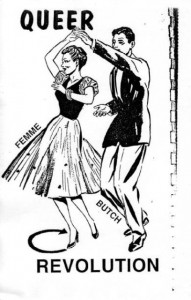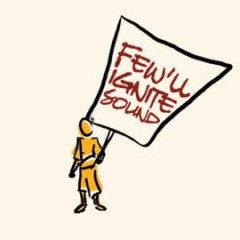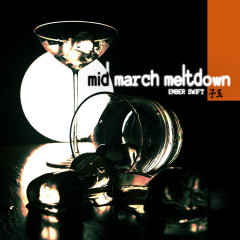Butch/Femme

Ever since I came out, the discussion of butch/femme has been a common one in the queer community. It seems to have lessened over the years as a central identity point, meaning: people don’t seem as hung up about it as they used to be. Then again, that could just be my particular perspective.
In the fifties, the gay community (not then yet called “queer,” at least not from within) was positively locked into these binaries. It was required to identify as one or the other as the heterosexual simulation of couples was the norm, with one partner being the “woman” and the other being the “man” regardless of their biological sex.
There was a loosening of these expectations in the late 60’s and 70’s (I’m not really sure about the 80’s—was there anything happening then except consumerism and Rubik’s Cube?) but then when I came out in the mid-90’s it seemed to be back in full force.
This was different than it was in the 50’s, though. When I encountered the expectation of butch/femme as a young queer, it wasn’t an imposed expectation from the greater society to somehow “fit in” or emulate the straight majority; it was more of an expectation from within the community as though the binary reinforced the strength of your identity or belonging…. or something.
As foggy as it was to pin down, I felt pressured to choose.
Of course, I have always looked the way I look, but when I had just come out at 19 and was hanging out in the Ottawa and Hull gay scene, I was committed to being as “butch” as possible. I mistakenly associated “femme” with weakness and a capitulation to society’s expectations. I donned big boots, lumber jacket, shaved my head and refused to wear make-up in protest. I felt tough.
These were just trappings, I know, and I recall a conversation in a restaurant one day, sharing brunch after a night of partying, when a gay male friend of mine commented on my natural femininity. He said, flippantly, that I could hardly claim the “butch” title.
I was horrified. I remember gesticulating wildly about my contrary opinion when he cut me off pointing to my dancing hands and said, “Men in my community who use those kinds of hand gestures are automatically ‘femmes.’”
My hands immediately found my lap. What was I so afraid of?
I came to accept that I was (and am) naturally feminine, but I still kept myself guarded. I spent the next decade finding the word “pretty” rather insulting, for instance, and went out of my way not to be seen as such, especially by men. I resented the objectification and implied dismissal of my inner strength and value.
And as a result, I have always been attracted to the androgyny that I wasn’t born with but secretly craved. My partners, looking back, all tended to be “pretty tomboys” or queer women who were more on the “butch” side. They all had beautiful, feminine features if you looked closely but were the type to sometimes be mistakenly ushered out of the women’s room and pointed to the urinals–especially in small towns.
This led others to see me, by default, as “the femme.” Yet, I never really fit into the full-scale femme culture either. I felt misunderstood most of the time and completely confused by this need to choose. Let’s just say I could pull off a skirt once in awhile but I always had dirt under my nails.
So, when I first came to China, I was surprised to feel my own brand of gender liberation here, especially in a society where gender is, for the most part, so clearly defined. Perhaps it was the fact that I was somewhere completely new, where no one knew me, where I was not on stage as the “queer poster girl,” and where I would never be remembered among the millions.
At first, I enjoyed wearing skirts more regularly. I got my nails done for fun and then enjoyed the way they looked (although that habit quickly waned, I admit!). For the first time, I felt less defensive when I received a “漂亮 piaoliang” or “美丽 meili” compliment about my appearance. I guess hearing “pretty” or “beautiful” in another language felt disassociated with the sociological power struggles imprinted from my Western upbringing. For the first time in my life, I tried out what being “femme” could be like.
This was short-lived but significant. I see it now as the final swinging of my gender identity pendulum to the opposite extreme before returning, finally, to the real me: someone who fits somewhere in between on the spectrum of gender expression and is free to swing one way or the other at any time she pleases. Quite simply, China helped me be myself unapologetically.
And then I met Guo Jian. To me, he embodied everything about the androgyny that I’m attracted to, just in a mirror image: biologically male but beautifully feminine. And, as the obvious genetic female here, it’s ironic that for the first time in any of my relationships, my “butchness” is not in question.
In our early relationship, Guo Jian commented that I walk like a man. I laughed and said, “Is that a problem?” He just smiled.
Later, I learned through his loud complaining and whining that he hates carrying heavy things. So, I haul the heavy stuff up and down the stairs while sometimes chiding him for being a wimp. The truth is that I like the workout and he’d much rather “supervise” by clearing the path ahead of me.
He’s also addicted to shopping and buys clothes and shoes far too regularly, to the point where he’s come to sometimes hide new acquisitions to his wardrobe from me for fear of reprisal.
I also do most of the driving and can parallel park far better than he can. In fact, he’s even boasted of this fact within his group of friends as the kudos he gets from having a female partner who can parallel park outweighs the loss of face he might feel for not being able to do it very well himself.
Guo Jian has far more “purses” than I’ve ever seen, let alone used. He calls them “bags,” as this is the term for them here rather than having a gendered term like we do in English. Guo Jian even changes them to match his outfit!
He also hates scary movies and has never been into organized sports. He really can’t throw a ball very far. He doesn’t like having dirty fingernails. He likes necklaces and rings but could never get his ear(s) pierced because he didn’t want to go through the pain. He’s very proud of his clear and soft skin.
These are just a few examples.
When we were first together, I remember one day noticing from behind how feminine Guo Jian’s body was. He was lying on his side on the bed with his back to me, in his underwear. The small amount of extra weight he has in his waist area against his otherwise lean frame gave him the appearance of having womanly hips, a bit like a renaissance painting before my eyes.
Later on in our relationship, he complained about his “hips,” saying that he’s always had them and has learned to wear his clothes in such a way as to disguise them. I smiled and reminded him that I used to only date bodies with accentuated hips and so I especially love his. If I can get close enough to sneak a pinch in once in awhile, he’s sure to squeal with a mixture of delight and disdain. He’s so ticklish, it’s hilarious.
About a year into our relationship, he said to me, “You know, sometimes I’m a bit like a girl and sometimes you’re a bit like a boy. We really balance each other out. It’s like Tai Chi—the black and white swirl; we are meant to be together, you know.”
He punctuated this statement with a wink and I realized it was the first time he had acknowledged his “not-so-masculine” ways, verbally. I took my cue to not make a big deal out of it and just nodded my agreement with a smile. Even now, I wonder if I even could make a big deal out of it. Guo Jian is so comfortable in his skin, it’s inspiring.
So, I guess what I’m getting at is that my whole notion of “butch” and “femme” has now been fully explored thanks to my current (and hopefully final) relationship. I am aware of my own feminine and masculine qualities as they exist naturally in me and I finally don’t need to identify as either extreme.
I’m now partnered with someone who simply is who he is without any socialized stigma of having to be a certain way either. He’s the type who has never apologized or felt pressured to be anything but himself, even if it’s the kind of man who sucks at parallel parking or who is more willing to carry the baby than the baby stroller down the stairs. It’s refreshing to witness.
And, considering this is a heterosexual partnership in which I’m always going to be seen as the woman (by extension, “femme”), you’d think I’d be especially irritated by the gender assumptions I have to deal with, but in fact the opposite has happened. I’ve come into a sense of peace about it all that I hadn’t ever thought possible.
When he turns to me and says, “你怎么那么漂亮?ni zenme name piaoliang?” or “How’d you get so pretty?” and gives me a hug, I now have no guards up and can just melt into the compliment. He also sometimes tells me that I look “帅 shuai” or “handsome,” especially if I’m decked out in the “rock” look all dressed in black with big boots and shades. I like that both adjectives are applicable to me in this language. I may be the woman here, with a womanly physique and natural femininity, but I still have the right to be handsome in Mandarin. That’s liberating.
Likewise, when I tell him he looks handsome, he struts like a rooster. And, equally, when I tell him he’s my pretty man, he beams.
It works for me.







